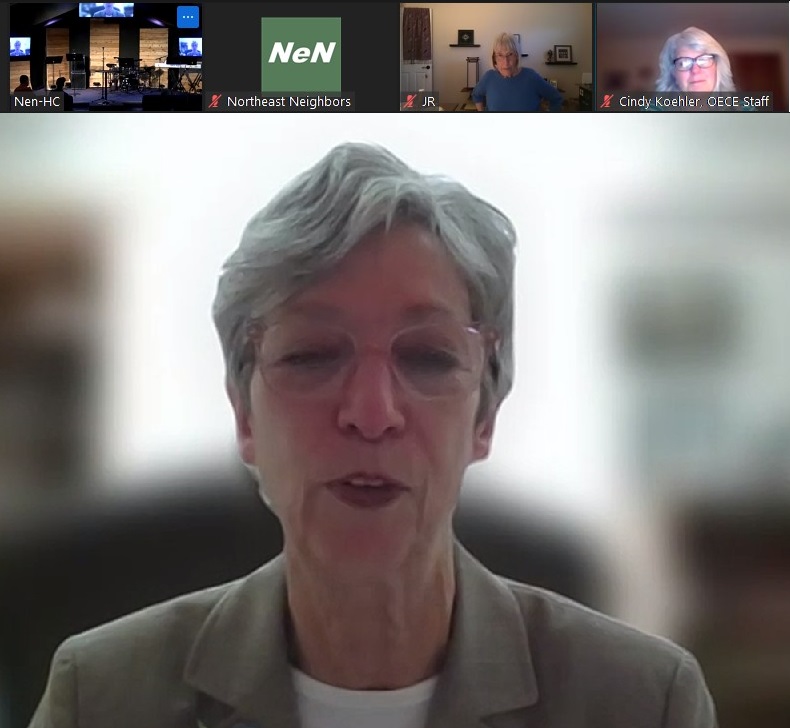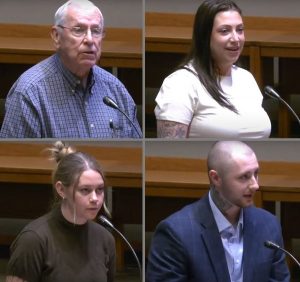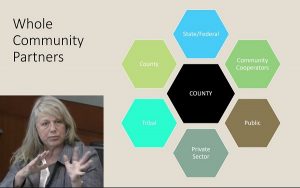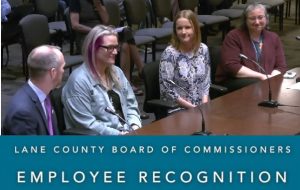Rep. Nathanson: Senate walkout stalls housing bills
5 min read
Northeast Neighbors heard an update on the legislative session May 30.
[00:00:06] Rep. Nancy Nathanson: Hi there. It’s Nancy talking… to give you an update on housing.
[00:00:11] The package that the legislature passed earlier this session, it’s already been through the House and the Senate and the governor signed it. It did a number of things. It put $130 million toward the governor’s emergency declaration about homelessness. So it unleashes state agencies to do a number of different things to help homeless people.
[00:00:33] We invested $25 million in what’s called the Rural Oregon Continuum of Care to help rural and coastal communities.
[00:00:44] Part of this bill will help fund rental assistance and services to help people stay in their homes. This part of the bill was a compromise between landlords and tenant advocates. It gives a little bit more time for eviction—10 days—a little bit more notice so that the tenants can access the available agency funding that helps them stay in their homes.
[00:01:11] We invested $25 million to help youth with shelter, rental assistance and mental health or substance abuse services aimed at youth who are homeless. And we are also doing some things to invest in affordable modular homes and financing models and onsite workforce housing for farm workers.
[00:01:36] So that’s already passed, but what’s still in the pipeline—and I hope this just takes about another minute to blast through—
[00:01:43] As you know, there’s at the current time a shutdown in the Senate. So there are a lot of House bills that are stalled over there in the Senate. There’s even a little bit of Senate work that’s stalled over there, but here’s what’s in the pipeline that could also help related to housing.
[00:02:01] One of the bills is mine. It’s aimed at renters or people who want to be renters. They’re applying and they’re paying for a screening charge. If the landlord doesn’t ever do the background screening, because let’s say the landlord took in one or two dozen applications. You know, there’s a lot of competition for rental housing.
[00:02:24] So let’s say they take in a dozen or more applications, they do a background check on the first few people, they select one, they’ve collected a charge, an application screening fee from everybody else. By law, they’re supposed to return those fees if they don’t ever do the background check. And most landlords, of course, just return the fee.
[00:02:46] Some landlords are not getting around to returning the fees, and those renters who don’t have much money really need that fee so they can pay for another application. I have a bill stalled in the Senate that passed with bipartisan support in both the House and a Senate committee already to help get those fees back to them.
[00:03:09] There’s another bill that it, it’s called House Bill 3042. Some of you know that there is housing that has been affordable, called affordable units for let’s say 30 or 40 years. Whoever developed it initially had public funding to help lower the cost of building it, and in a, in agreement for taking that public funding, they kept the price affordable.
[00:03:35] Well, now that that contract is expiring, those rental units convert to market rate. And so there can be an immediate, very sudden rise in rental rates, many, many percentage points that these tenants would be faced with in the next 10 years. Those restrictions will come off on over 7,000 units of housing.
[00:04:02] So that puts that many more people in jeopardy of not being able to find affordable housing. So there’s a bill to give them a 30-month notice because the landlords know well in advance that those units are going to be converted to market rate. So it gives 30 months notice. And they’ll also be required to inform any new tenants who might be moving in, that that rent is going up to market rate.
[00:04:29] So that’s just to bring some fairness and stability in that area.
[00:04:33] There are two more I want to tell you about, really fast.
[00:04:36] One is more about childcare, but it affects housing. You all know that one of the stumbling blocks for business being able to hire people is we hear from many, many businesses that they can’t get some of their workers back because the workers can’t find affordable childcare. So, there’s a bill that’s requiring local government to allow childcare in certain situations. It has to be approved by the agencies that approve the childcare facility.
[00:05:08] There’s another then, one that would require local government to allow a building to be converted from commercial use to residential use without requiring a zone change if the property is within the local government urban growth boundary. So you may want to check with Eugene’s city council or planning officials on how the city would handle that kind of legislation if it ultimately passes.
[00:05:36] And then the last one I’m so excited to tell you about is some of you know of the fantastic work that’s being done by Square One Villages. Some of you know Dan Bryant, who has been behind the tiny homes movement and developing some of these very, very affordable units to get people out of their emergency homelessness.
[00:05:58] Well, Square One Villages is also developing something called limited equity co-op housing, so that renters would actually become owners of a co-op, so they would have a stake in their own housing and feel that pride of ownership and build some equity for very-low-cost affordable housing.
[00:06:22] So there are a couple of bills that I’ve done to help Dan Bryant and Square One Villages accomplish the work that they’d like to get done in Eugene. Most of these projects rely on not only some direct grants and subsidies, but also some preferential tax status. And this would extend some of that tax status instead of just to rentals and instead of just to mobile home parks, but to this new model that Square One Villages uses called limited equity co-ops.
[00:06:54] So I’m helping with that. That bill is also stalled right now, but let’s hope for the best that this session can end with some good news for everybody.
[00:07:03] John Q: Rep. Nancy Nathanson’s two House bills, 2465 and 2466, would help the tiny homes movement. But Republican senators have been staging a walkout since May 4, and the bills have been stalled. At the June 1 session:
[00:07:18] Senate President Rob Wagner: Colleagues, the sergeant-at-arms has reported that unexcused members cannot be located. Therefore, there is no quorum for the Senate to conduct its business.



